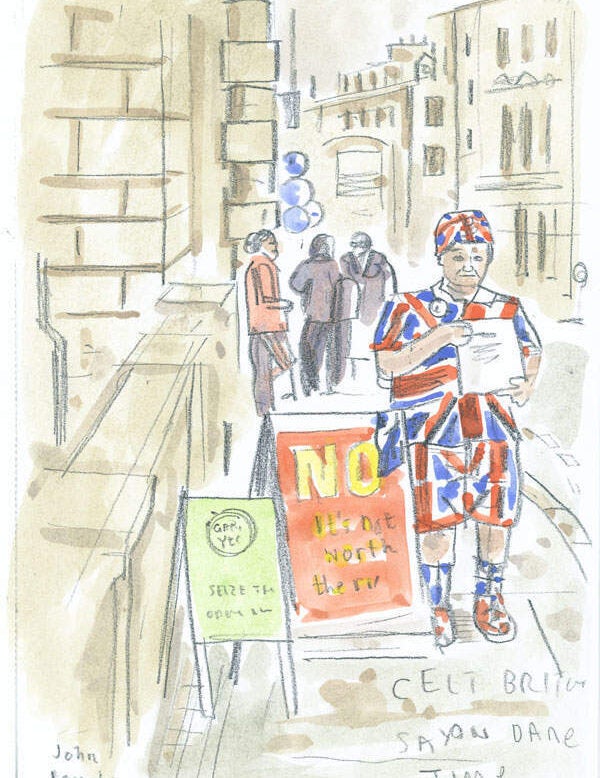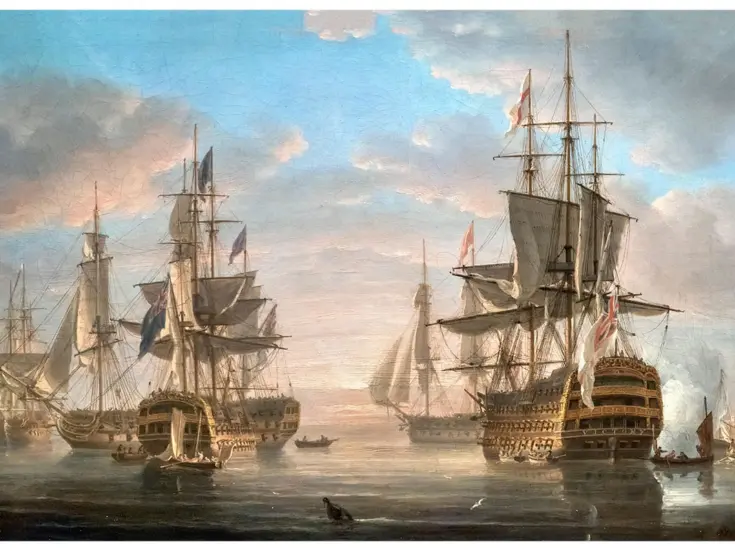

The last time I got up at 5.30am to walk the bleak, grey stone streets of a country on the verge of potential cataclysmic historic change was back in 1989 when – as a 19 year old skiving off my lectures – I witnessed the smashing up of the Berlin Wall with thousands of Germans wielding sledgehammers and pick-axes (a piece of the wall sits on the bookcase in my study) as the foreign editor of Varsity, the Cambridge newspaper.
That revolution – which brought about the end of the Cold War political era and introduced democracy and capitalism to formerly politically oppressed parts of Eastern Europe – has consequences that are still felt today as we see the relative stability of the Cold War era being replaced by a world of increasing separatism, nationalism and financial instability.

‘We’re all doomed’: New Register House by Adam Dant
See all of Adam Dant’s Edinburgh sketchbook here
Such are the stakes today that as Scotland has headed towards its ‘Day of Destiny’ – to quote the rather uninspired headline splashed across the blue and white front page of The Scotsman this morning – there has been no shortage of would-be Boswells stepping forward to advocate their reasons for voting either Yes or No in today’s historic vote.
I make no apology for joining to the glut of such pro-Union essays. So let’s quickly get my Anglo-Scottish blood ties and personal history out of the way so I can get onto the real reason – the impact on both Scottish and British tourism as well as Britain’s reputation as a pre-eminent global financial services provider – that I am so troubled about today’s vote and the irrevocable loss a Yes vote could have on both England and Scotland.
My wife is half-Scottish. She comes from an old military Scottish family who have a long and proud history with the Scots Guards. Her grandfather was one of the most senior British generals in the Cold War as well as being commander in chief of the Scots Guards.
Her ancestor General Charles Cathcart served under Wellington at Waterloo where he had three horses shot under him during the battle. Waterloo is an example of just how well the Scots and English have always worked so well together, not the least as soldiers in battle. In 1837 General Cathcart was made commander of the forces in Scotland and governor of Edinburgh Castle.
As I write, my wife has gone off shopping to ‘buy a kilt’ along the Royal Mile so strongly does she feel that she does not want the strong blood ties she has to both England and Scotland to be severed.

Pictured above: Lady Laura Cathcart in her new kilt stands next to her ancestor the Hon Mary Cathcart (later Hon Mrs Graham) in the painting by Gainsborough at the Scottish National Gallery
While I cannot claim anything like such Scottish roots, my own family are directly related to the Scottish family of William Cash which originated when King Malcolm awarded an estate to the Earl of Fife who was marrying the king’s niece, called Cash (or Cashel), from where the ‘Cash clan’ came, living between the hills between Falkland and Strathmiglo.
The Cash clan grew throughout the region with the name Cash still common on farms and roads and hills around the area. In 1612, a William Cash of this clan who worked in the American Colonies trade sailed from Scotland to Salem, Massachusetts, with a boat full of pilgrims which included a nephew also called William Cash who had born in Scotland in 1653.
Bizarrely, when the legendary American country singer Johnny Cash became interested in his family history, he found that he was descended from this direct branch of the Scottish Cash family and he paid several visits to Scotland to see where the Cash clan came from.
As a result of this family connection, my wife, my parents and I were invited by Johnny Cash’s singer daughter Roseanne to attend her concert earlier this year at the Barbican. Afterwards we went backstage where she showed me an old photograph of a Captain William Cash who served in the Confederate army. Another example of Scottish blood fighting alongside other nationalities in a common cause.

‘High waisted’: Charlotte Square by Adam Dant
See all of Adam Dant’s Edinburgh sketchbook here
The last few weeks has seen many other examples of this genre of the ‘personal blood essay’ writing with editors, business leaders, politicians, hedge fund managers, entrepreneurs, soldiers, actresses and sports stars all reaching back into the mongrel narrative of their Anglo-Scottish family histories to disclose their ties with Scotland – and why they are (mostly) so troubled by the idea of divorce from their Scottish roots and shared sense of identity.
Spear’s has always advocated that a shared national identity is key to Britain – and that Britain’s place in the world as one of the great financial service providers (not just to HNWs but as a pre-eminent global financial and trading centre) is inexorably tied up with not just London being a financial powerhouse but Edinburgh as well.
Reading in today’s paper that tens of millions of pounds in sterling notes have been secretly shipped up to Scotland in the last week to provide Scottish banks with enough cash in the event of a run in the event of a Yes vote is deeply worrying.
If there is a Yes vote, Scottish banks and financial institutions are likely to be hit by a hammer blow by the markets with billions being sliced off their values. Financial markets thrive on market confidence. Talk of ‘short-term deposit flight’ is deeply damaging to the idea of the United Kingdom being a front-line global financial centre.
The idea of waking up to an amputated or broken sense of identity from tomorrow is key to why the Scottish Question has turned increasingly hostile and vociferous in the last week or so.
At the very heart of what constitutes the idea of the United Kingdom – forged in 1707 from the Act of Union – is a sense of shared identity. This is now under serious threat thanks to the inept misjudgement of the Westminster political class, led by David Cameron who has (once again) shown extraordinary political naivety – as well as blind political arrogance – in his incompetent dealings with Alex Salmond.

‘Friesian freedom fighters’ by Adam Dant
See all of Adam Dant’s Edinburgh sketchbook here
Much has already been written about the bungling nature of the way the referendum question was phrased and approved by Cameron; his myopic and out-touch belief that the referendum was a good idea as he could finally ‘throw down the gauntlet’ at Salmond with a humiliating and runaway victory based on some early polls; and his poorly judged decision to allowing sixteen year olds to vote.
Alas, to seasoned Cameron observers such errors of judgement come as little surprise. What nobody up here can still fully grasp is how on earth Cameron – supposedly an experienced Westminster politician – allowed himself to get into this monumentally ill-advised position – putting over 300 years of shared history and cultural identity at extreme risk.
But then Cameron has form here over his ‘judgment’. In truth, he completely underestimated Salmond and the brutal and ruthlessly effectiveness of his nationalist campaigning (over £150,000 is being spent today on an armada of local taxis for ferrying sixteen and seventeen year old voters to the polls).
The No campaign has been largely patronising, negative and inept – reaching a low point when the No campaign bragged that voting No would give every Scottish family the chance to enjoy an extra week’s ration of ‘fish and chips’.
In today’s Scotsman, both sides have been given a page to sum up their arguments. The No article is insipid, fear mongering and dull. It also commits the cardinal political crime of assuming that the Scottish people define themselves, their identity and self-worth in financial terms.
The Scots are prouder than that and the terms by which the No campaign have attempted to stereotype and define the Scots – thinking they can buy them off with promises of more fish and chips is simply insulting.
Just as the Tories in England have misunderstood the values that define why people choose to live in the countryside – it is for aesthetic, leisure and ‘quality of life’ reason rather than for simply economic reasons – so they have once again made the same mistake with regards to thinking they can bribe the Scottish people with their hastily put together emergency ‘Home Rule’ offer.
No amount of financial promises will eradicate the fact that the Scottish simply do not define themselves in economic terms. And they also don’t like being told what to do – let alone think – by anybody, especially the ‘out of touch’ Westminster political class.
The Scotsman article today by Salmond – who read medieval history at St Andrews and was a committed Marxist for many years – is colourful, very well written, impassioned and confident – reminding the Scottish people that for all the sneering in Westminster at how Scotland are benefit-junkies, Scotland – according to the Financial Times – is actually ‘among the top 20 wealthiest countries in the world and we are wealthier per head than the UK, France and even Japan’.
Which brings me onto my real cause for concern over today’s vote. I am writing this in a dining room full of affluent American tourists. As I type I can actually overhear a woman of around sixty extolling on the joys of the golf swing of Rory McIIroy (who is from Northern Ireland).
There were 2.5 million foreign visitors in 2013 – closer to 3 million this year because of the Commonwealth Games. As Spear’s argued when we launched our Save Britain’s Historic Landscape campaign, the idea of what it is to be British is inexorably interlinked with a sense of national identity that is rooted in a shared landscape and geography; even if this deep sense of identity is built on a largely imaginative sense of romantic nostalgia.
But it is a nostalgia that is essential to the Scottish economy and indeed the British economy. In the Edinburgh New Town dining room in which I write on the morning of the Scottish Referendum – a large town-house built in the 1820s – there is a Scottish pastoral scene mural painted by the celebrated 19th century Scottish landscape artist David Roberts. The mural depicts a happy romantic couple, with their dog, dangling on a hillside ledge, with the majestic scenery of the craggy Scottish mountains disappearing into the unspoilt landscape behind them.
This scene is exactly the sort of Victorian romanticised idea of Scotland that helps bring in tourists. Tourism is one of the largest industries in Scotland, supporting around 200,000 jobs and contributing more than £11 billion ($17.7 billion) annually to the economy, according to government statistics.
While there has been plenty of snarling talk in the last few weeks about the value of Scotland’s natural ‘assets’ (mainly oil and gas), the debate has focused almost exclusively on deeply polarised figures.
According to a report published in today’s Scotsman, an independent Scotland would set up a sovereign wealth fund – similar to Norway’s – that the Yes campaign claim can bring in £147 billion within 25 years with an annual income of £2.9 to £5.8 billion. Yet the No campaign belittle such claims saying that this ‘black gold’ will run out and will provide far less financial security.
But such talk misses the whole point – to me at least – about Scotland. The wonderful Scottish scenery that David Roberts has drawn in the mural here at the Howard Hotel is beyond value. Scotland’s greatest asset is not its black gold but rather the great beauty of its countryside and its rich history that have made tourism one of the cornerstones of the Scottish economy.
The Queen, Balmoral, the Highland Games that Cameron was not recently invited to and the romantic mountain landscapes that are celebrated in the works of Roberts as well as in the superb exhibition of the Scottish works of John Ruskin (from a Scottish family) currently showing at the Scottish Portrait Gallery are all part of this Scottish tourism magic.
Yet this priceless countryside is under deep threat from today’s vote. In his article in The Scotsman today, Salmond makes no attempt to hide his enthusiasm for supporting the renewable industry in Scotland – allowing foreign owned giant German, Dutch and other foreign energy firms to desecrate the rolling hills and landscapes of the Highlands with giant wind farms that will ruin the appeal of Scotland for tourists for ever.
Salmond’s cosying up to the Chinese – who he wants to invest heavily in Scotland – is just as worrying. Will the Chinese oil, gas and renewable energy developers care about the Scottish countryside and mountains and hills that have made Scottish tourism one of the great success stories of recent times? I doubt it. Scottish-English tourism is another of our great unions and having passports and border controls is not going to help with tourism growth.
Already in today’s papers there are highly damaging reports of hundreds of tourists – especially from America – cancelling their holidays this year and next because they don’t want to go on holiday in a ‘divided’ country, and a country that – by the aggressive tone of the Yes campaign – has fuelled nationalism, xenophobia towards foreigners and hate.
I look again up at the happy faces of the couple in the Roberts mural. Judging by the excited faces on the queue of 80 or so ‘Yes’ voters – most dressed in a bright blue sea of blue tee-shirts standing outside a polling station close to Queen’s Park shortly before 7am this morning – today’s vote could well see a different union severed by tomorrow morning.
As I ate my breakfast this morning, the maitre d’ told me a worrying story about the mural. ‘We used to have three of them in the hotel,’ he said. ‘But a few years back a painter who was doing some decorating in the hotel painted over the other two by mistake. He just painted the wall green and the pictures have been lost forever.’
I sincerely hope a similar fate does not happen to the Union tonight.








